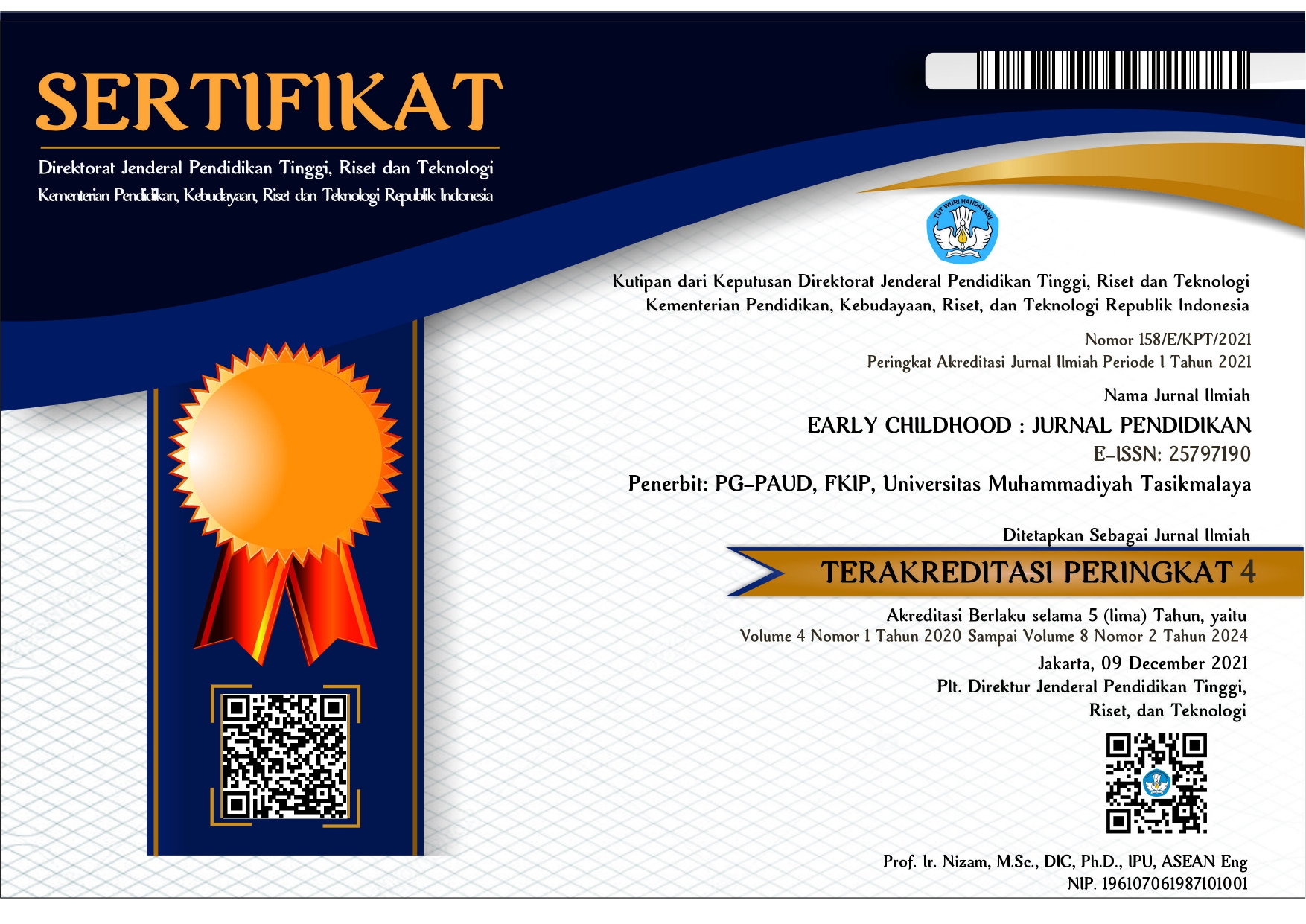PSIKOEDUKASI KESADARAN FONOLOGI DI PENDIDIKAN ANAK USIA DINI KOTA TASIKMALAYA
DOI:
https://doi.org/10.35568/earlychildhood.v2i2a.284Keywords:
Psikoedukasi, Kesadaran Fonologi, Pendidikan Anak Usia Dini., Psychoeducation, Phonological Awareness, Early Childhood EducationAbstract
ABSTRAK
Makalah ini merupakan hasil penelitian yang bertujuan mengimplementasikan psikoedukasi kesadaran fonologi di sekolah dasar. Psikoedukasi kesadaran fonologi merupakan pelatihan yang mengembangkan sensitivitas anak terhadap struktur bunyi. Psikoedukasi ini dilakukan sebagai upaya stimulasi dan optimalisasi terhadap potensi berbahasa yang dimiliki anak sesuai dengan tahap perkembangannya dan memberikan layanan, serta bimbingan yang dibutuhkan anak dalam melewati tahap-tahap periode sensitif yang dilaluinya dengan cara menggunakan berbagai aktivitas praakademik untuk mengembangkan kesadaran fonologi.
Pendekatan yang digunakan dalam penelitian ini adalah pendekatan kualitatif dengan menggunakan metode deskriptif. Teknik pengumpulan data dalam penelitian ini adalah dengan metode observasi dan wawancara dengan guru. Observasi dilakukan di dalam kelas untuk melihat kesadaran fonologi anak. Upaya guru dalam pengembangan kesadaran fonologi anak didapatkan melalui wawancara dan pengamatan secara langsung. Setelah dilakukan observasi dan wawancara, selanjutnya dilaksanakan psikoedukasi kesadaran fonologi kepada siswa dan guru.
Pemilihan metode yang akan digunakan dalam psikoedukasi pada anak dapat disesuaikan dengan tingkat usia anak. Deteksi aliterasi dan deteksi fonem tunggal relatif mudah bagi anak, yaitu untuk mengenali bunyi silabel awal yang sama (pada purwakanti) dan bunyi silabel akhir yang sama (pada sajak) dari kata-kata yang disajikan. Adapun teknik psikoedukasi dapat melalui lagu anak yang bersajak ataupun melalui kegiatan berpantun. Metode dengan tingkat yang lebih sulit yang dapat digunakan seperti metode deteksi fonem tunggal; di sini tingkat kesulitannya sudah meningkat, karena anak harus mengenali unit bunyi yang lebih kecil daripada silebel. Apabila keterampilan tersebut telah dikuasai, lebih lanjut anak dapat diberi pelatihan dengan metode yang semakin tinggi tingkat kesulitannya seperti metode ketukan fonem.
Kata Kunci: Psikoedukasi, Kesadaran Fonologi, Pendidikan Anak Usia Dini.
ABSTRACT
This paper is the result of a study aimed at implementing psychoeducation in phonological awareness in primary schools. Psychoeducation of phonological awareness is a training to develop children's sensitivity to the sound structure. This psychoeducation serves to stimulate and optimize the language potential of children according to the stage of development, to provide services and to provide guidance that children need to go through the sensitive stage in which they use various preschool activities to develop phonological awareness.
The approach used in this study is a qualitative approach using descriptive methods. The data collection technique in this study is the observation method and interviews with the teacher. Observations were carried out in the classroom to see the phonological awareness of the child. Teacher's efforts in developing children's phonological awareness achieved through interviews and direct observation. After conducting observations and interviews, then psychoeducation phonological awareness was carried out to students and teachers.
The selection of methods to be used in psychoeducation in children can be adjusted to the age level of the child. Alliteration detection and detection of single phonemes are relatively easy for children to recognize, namely the same initial syllable sound (in purwakanti) and the same final syllable sound (in poetry) of the words presented. The psychoeducation technique can consist of children's songs which are poetry, or dance activities. More difficult level methods can be used such as single-phonemic detection methods; here the level of difficulty has increased as the child has to recognize a sound unit that is smaller than the silebel. If these skills have been mastered, furthermore the child can be given training with methods that increase the level of difficulty such as the phoneme knock method.
Kata Kunci: Psychoeducation, Phonological Awareness, Early Childhood Education
Downloads

Downloads
Published
Issue
Section
License
Copyright Notice
Early Childhood Journal is an Open Access Journal. The authors who publish the manuscript in this journal agree to the following terms:
This work is licensed under a Creative Commons Attribution-NonCommercial-ShareAlike 4.0 International License.
Privacy Statement

The names and email addresses entered in this journal site will be used exclusively for the stated purposes of this journal and will not be made available for any other purpose or to any other party. Early Childhood allows the author(s) to hold the copyright and to retain publishing rights without restrictions.




